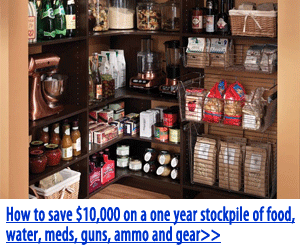Go ahead and do a web search for terms like: food peril, sustainable food, food shortage and the like. One would find a very long list of recent news alerts that forecast some troubling times ahead. Some people would say that we are to vote or allow our government to make the plans on how we receive food or prepare for a crisis. Many a debate is flying about for solutions to the shortage and high price of food. It seems the media has just recently realized what many people have seen coming for a few years. We cannot continue with the status quo. We need a more sustainable food.
The BIGGEST solution is to give incentives to those who would be able to grow local fresh produce, even on a small scale, and sell it to local markets. Small farms should be encouraged to grow wider varieties of foods that are needed in their areas.
Historically we as a people on this planet tended our own food needs for quite some time and flourished. Joseph planned for storage for 7 years of famine in the Bible. Grain storage and gardens were the norm for most of the American Mid-west for the majority of the history of the USA. Now we rely on the government and media to tell us what is the newest, easiest and most popular product to place on our tables and in front of our children. How is letting others dictate how we feed our family creating a sustainable food source? It’s not. Each family has to get back to growing at least SOME of its food.
Another sustainable food source is a dehydrated food product. The shelf life is greatly extended while no nutrients are lost due to overheating. A very good example of this product can be found A product with the ability to be shipped to orphanages and those in a severe food crisis will be very valuable as our supply and demand chasm widens due to price of gas and shipping. For those in urban areas or without the time or space to plant a garden this food source can be a nutritional life saver.
More effort needs to be put toward finding a variety of sustainable food sources that do not rely on governments or grocers. Looking outside the typical free-market, big-government box will be our best chance at finding more than one way to create and nurture a sustainable food source (or several) for our planet.
Related Content
- How to Build a Food Storage System: 7 Effective Tips for 2025
- How to Store Dry Grains: 7 Effective Tips for Long-Term Freshness 2025
- How to Choose the Right Silica Gel Packets for Grain Storage
- Food Crisis: Increase animal protein and grain
- The Ultimate Guide to 10 Effective food grade buckets for grain storage in 2025
Auto Amazon Links: No products found.




